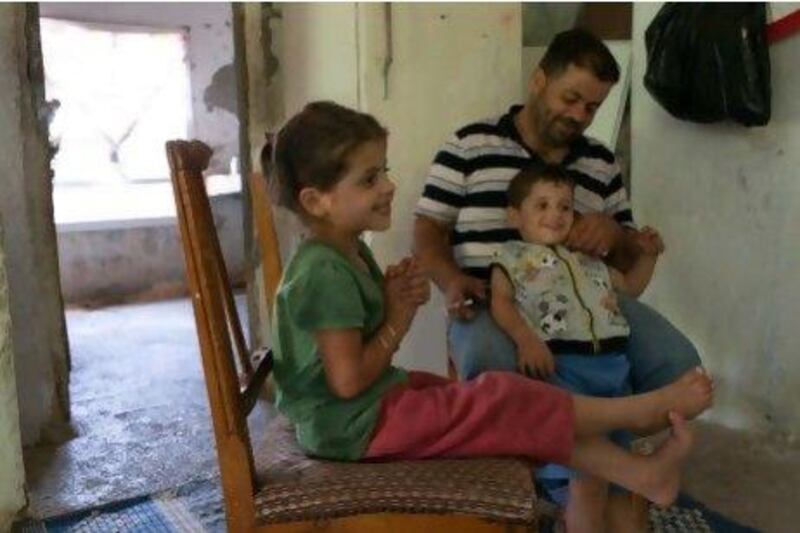NISRIN, Turkey // A fighter from the Free Syrian Army sauntered into the front yard of a run-down home on the Turkey-Syria border where his friends, three families of Syrian refugees, were living. Wearing a black shirt and camouflage trousers, he was on a mission: to wash his laundry.
The 36-year-old muscular fighter from Latakia, who declined to give his name, said he was a member of a rebel unit that was deployed about an hour's trek inside Syria and regularly carried out attacks against Syrian military positions.
Officially, the Ankara government says it is not a party to the conflict in Syria. But while defecting Syrian soldiers and recruits to the rebel cause are barred from brandishing weapons on Turkish soil, Syria's northern neighbour is a key, if tacit, ally for the armed opponents of President Bashar Al Assad.
Turkey provides them with a safe haven where they can retreat to rest, visit their families, receive medical treatment and, yes, wash clothes.
"There are many families here [in Turkey]. We come and go back," said the rebel from Latakia. When his camouflage fatigues and shirt were dry, he would return to the fight in Syria, he said, pointing to a nearby clothesline.
How easily rebels pass back and forth across the border is evident in the number of wounded fighters and civilians that are being treated in local hospitals and clinics, and by the refugee camps that shelter the families of rebels.
About 42,700 refugees are being sheltered in nine camps near Turkey's 911-kilometre frontier with Syria, Turkey's disaster relief agency said yesterday.
With about 1,300 Syrians crossing the border into Turkey in the past two days, an additional encampment would be built, it added.
There is also unofficial aid to the rebels and their supporters. Hundreds of Syrians live with relatives or friends along the frontier.
Ahmad Adul Wahad, a 33-year-old Syrian, said that he had helped transport wounded Syrians to Turkish hospitals, and that most of the dozen or so displaced Syrian families living near his village supported the uprising against Mr Al Assad.
Those who have fled Syria said that Turkish villagers, many of whom speak Arabic, have received them warmly.
"The Turkish family gave us this house for free - it was empty - and let us live in the village," said a Syrian man who had been in Turkey for eight months. The house is little more than a shack with missing windows, but it was an improvement on conditions in the refugee camps.
In exchange, the man and his family help to work their host's fields and receive some vegetables.
How long these pockets along the frontier will remain peaceful is unclear.
In response to the downing of a Turkish military jet, Turkey declared last month that any Syrian military unit approaching the border would be seen as a threat and dealt with accordingly. Since then, Turkish warplanes have been scrambled several times after Syrian helicopters skirted the frontier.
Near the border, the crack of gunfire is heard each day and the Syrian government has voiced its impatience with the rebel sanctuaries on its doorstep. And the reason is not the exchange of labour and shelter for food.
There is a thriving black market in arms here, said a prominent Syrian activist in Antakya, and the rebels are fuelling it, especially those recent Syrian army defectors who have no weapons. The Turkish government's prohibition on bearing arms is little more than a fig leaf on the burgeoning trade.
With Ramadan approaching, hopes are high among the rebels that the tide is slowly turning in their favour.
"If we have help with the helicopters, Assad is gone," said the rebel from Latakia. "We are sure it will end in Ramadan. God will help."
Others are more cautious. "We feel the regime will not continue for a long time, but we know in our mind that it will continue because many countries in the world support it," said Wasim Taha, a Syrian activist who recently founded the Syrian Relief Medical Organisation to provide medical support to injured Syrians.
"I am here because of the words 'Allahu Akbar'," said a Syrian man who has lived along the border in Turkey for a year and asked to be identified only by his nickname, "The Bird".
He rattled off the enemies of the Syrian opposition: Mr Assad, Russia, Hizbollah, Iran and China. "We are fighting five," he said.
Syrians living in Turkey are digging in for a long fight, he said. With the help of their hosts, the rebels will prevail, he added. "What happened to [the late Libyan leader Muammar] Qaddafi is so cute and kind. We wish to do much more" to Mr Al Assad."
[ foreign.desk@thenational.ae ]
* With additional reporting from Thomas Seibert in Istanbul






